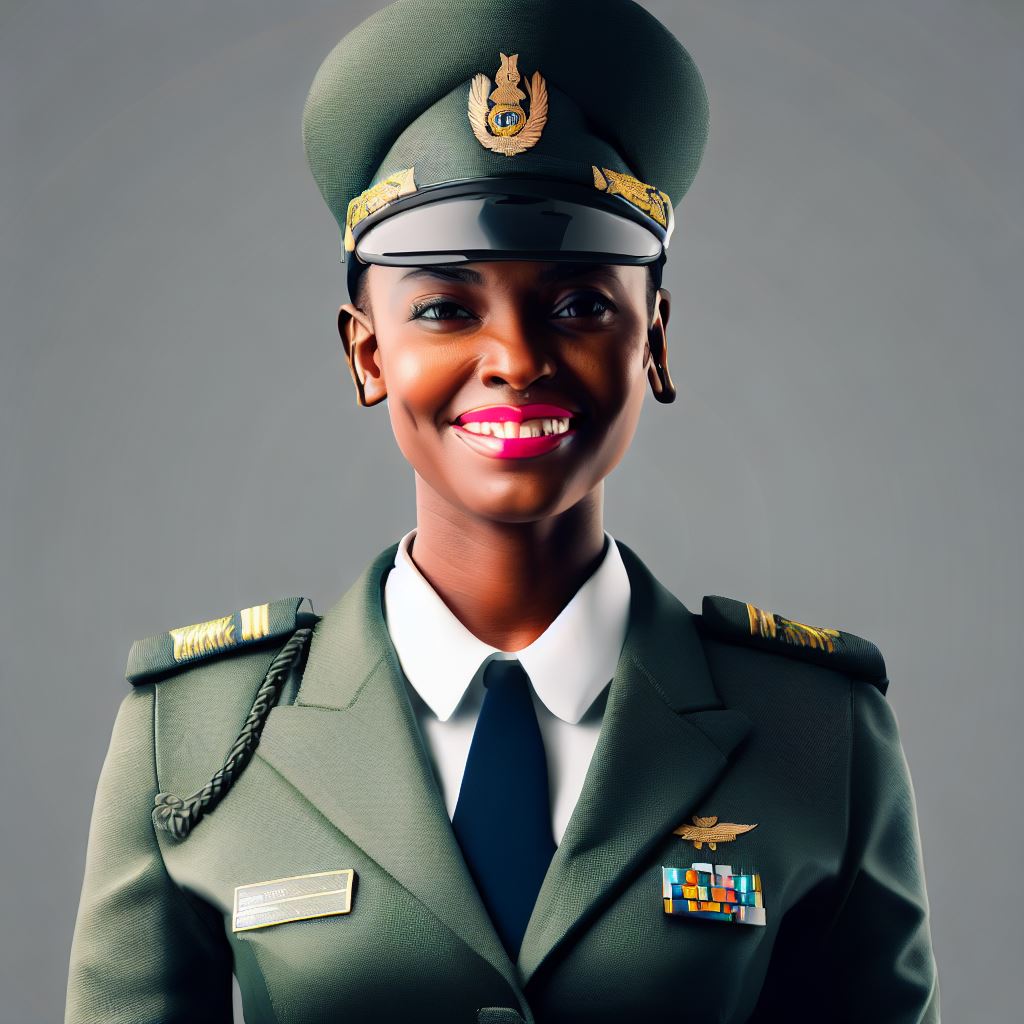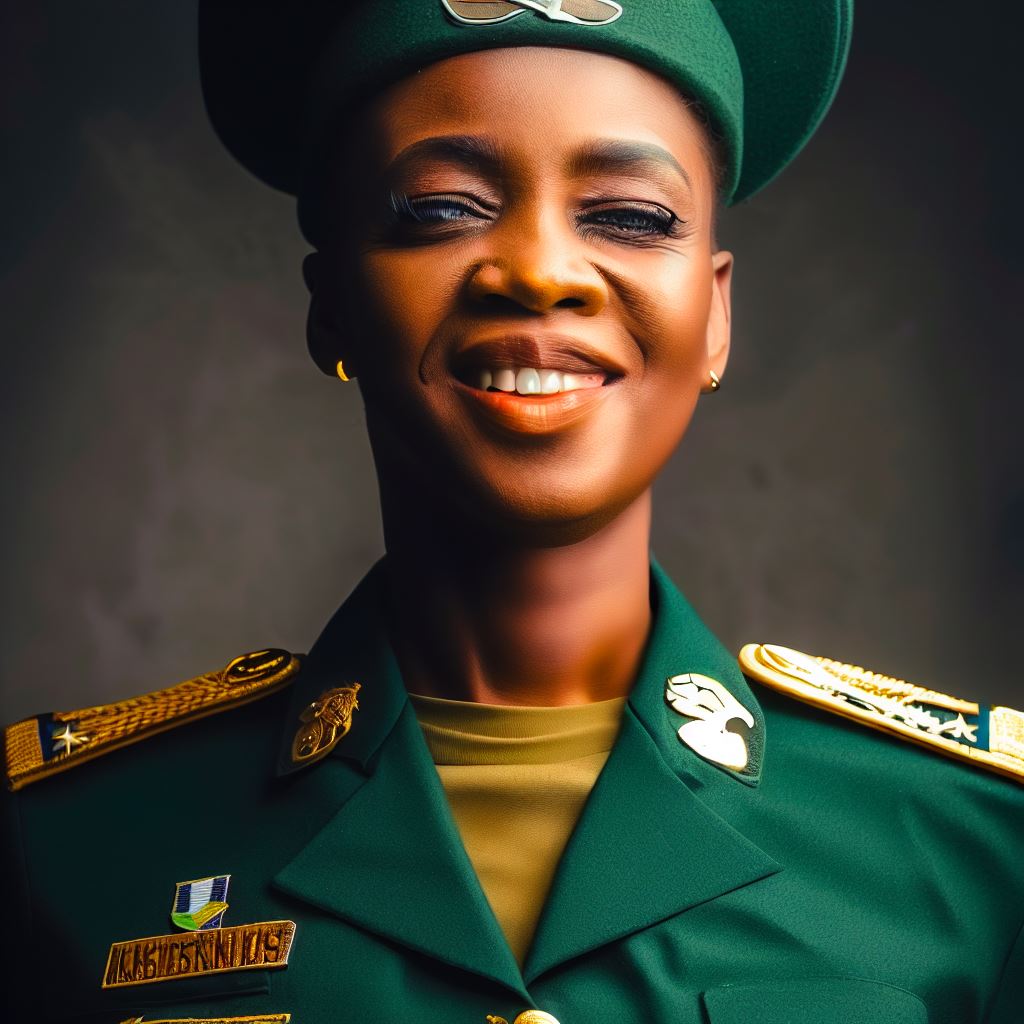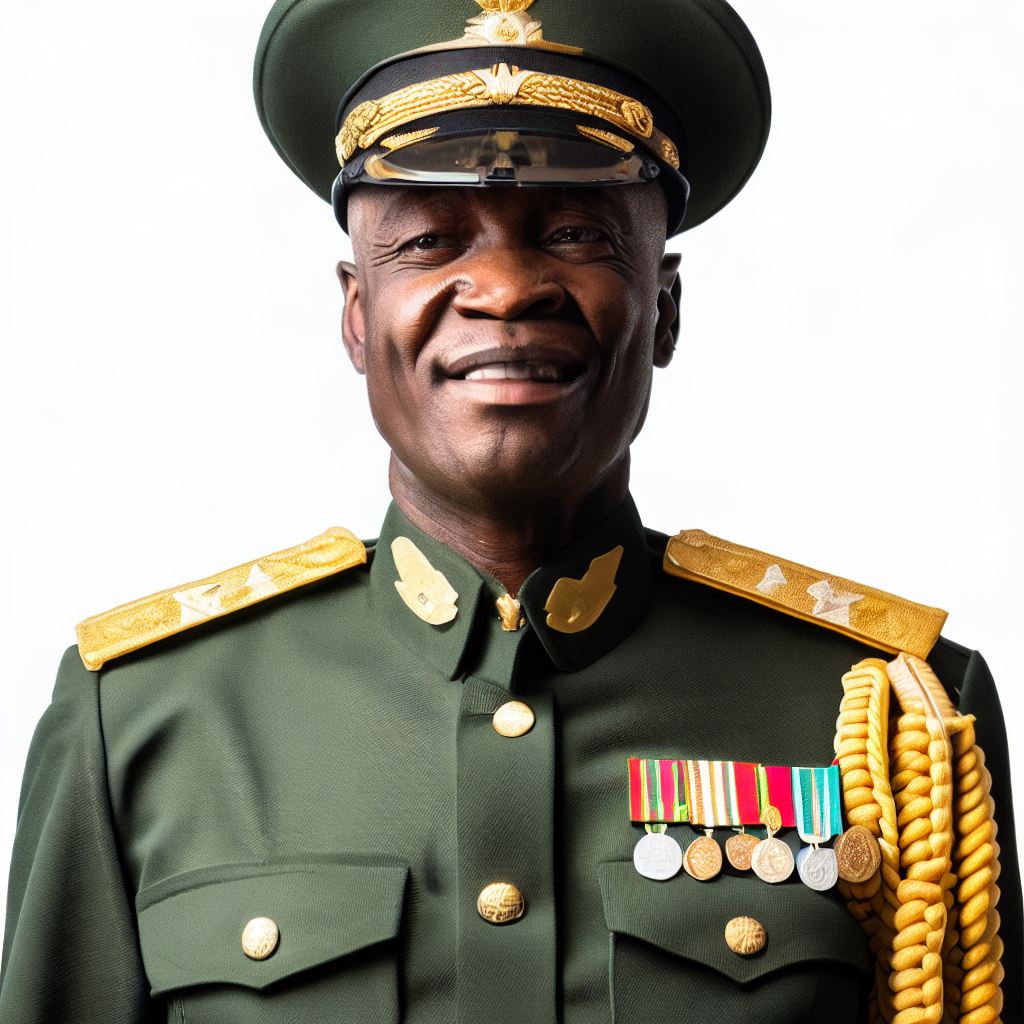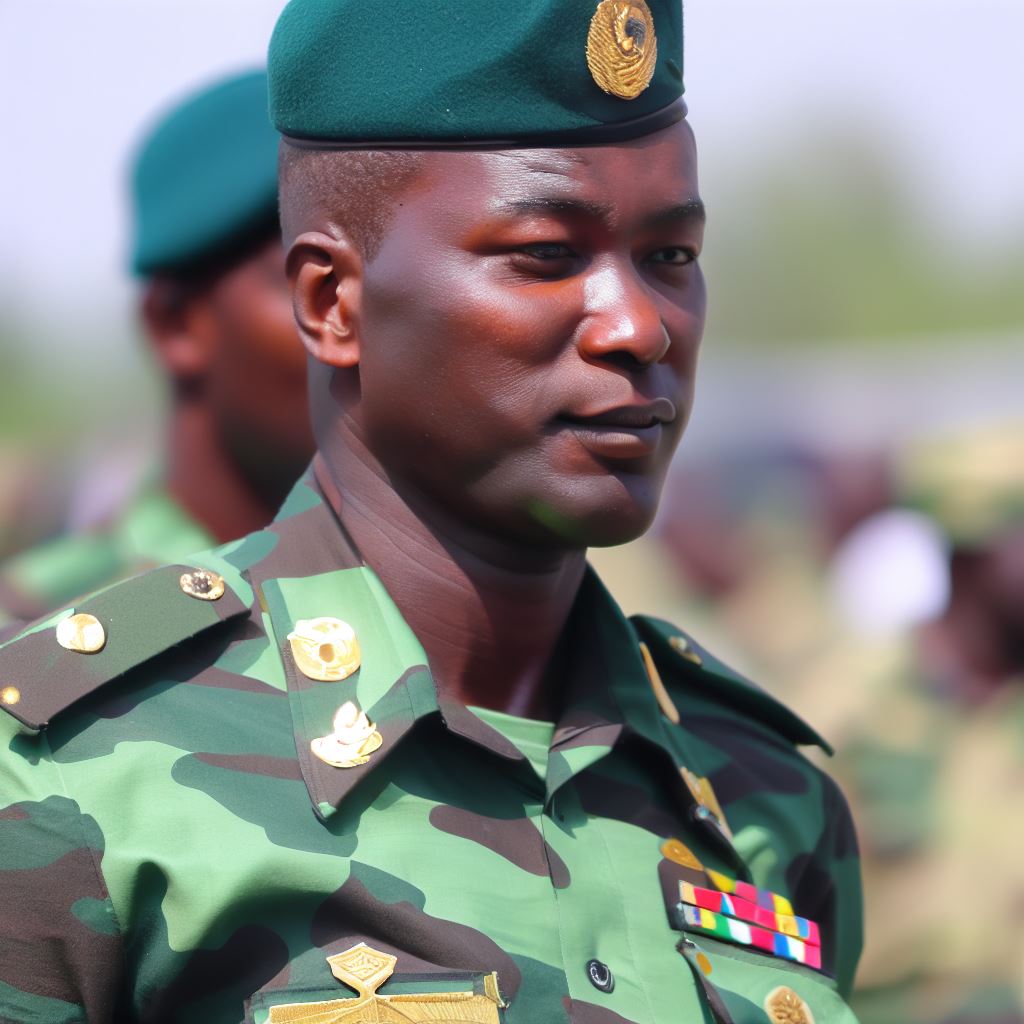Introduction
Nigerian Air Force officers play a vital role in safeguarding the nation’s airspace and defending its sovereignty.
The Nigerian Air Force serves as a crucial component of the country’s military defense. With this blog post, we aim to provide a comprehensive overview of a career in the Nigerian Air Force.
History of Nigerian Air Force
The establishment of the Nigerian Air Force in 1964
The Nigerian Air Force was established in 1964 as a component of the Nigerian Armed Forces.
Initially, the Air Force faced multiple challenges in terms of equipment and training due to limited resources.
Significant milestones achieved over the years
Over the years, the Nigerian Air Force has achieved significant milestones. Here are some notable achievements:
- Combat Operations: The Air Force has played a vital role in various combat operations within Nigeria and in international peacekeeping missions.
- Modernization: Continuous efforts have been made to modernize the Air Force by acquiring state-of-the-art aircraft and equipment.
- Training and Education: The Air Force has improved its training facilities and collaborations with international partners to enhance the skills of its officers.
- Humanitarian Activities: The Nigerian Air Force has been actively involved in providing humanitarian aid during natural disasters and emergencies.
- Research and Development: The Air Force has invested in research and development to improve its capabilities and stay ahead in modern warfare.
- Air Power Symposium: The Air Force regularly organizes the Air Power Symposium to discuss and exchange ideas on air strategy and future developments.
- Peacekeeping Operations: Nigerian Air Force officers have participated in United Nations peacekeeping missions in countries like Sierra Leone and Liberia.
- Collaboration with Foreign Forces: The Air Force has collaborated with other countries, such as the United States and the United Kingdom, to train its officers and improve operational capabilities.
- Training Academies: The Nigerian Air Force has established training academies, such as the Air Force Institute of Technology and the Air Force War College, to develop its officers’ knowledge and skills.
- Air Shows and Demonstrations: The Air Force regularly organizes air shows and demonstrations to showcase its capabilities and inspire young individuals to join the service.
The initial challenges faced in terms of equipment and training
- Air Defense: The Air Force has strengthened Nigeria’s air defense capabilities by deploying modern radar systems and surveillance technologies.
- Strategic Lift Capability: The Air Force has acquired cargo aircraft that provide strategic airlift capabilities for both military and humanitarian purposes.
- Search and Rescue Operations: The Air Force has a dedicated Search and Rescue Unit that responds to emergencies and conducts rescue operations.
- Interagency Cooperation: The Air Force collaborates with other security agencies to tackle security challenges and maintain national peace and stability.
- Women in the Air Force: The Nigerian Air Force has opened opportunities for women to serve and excel in various roles within the organization.
Despite the challenges faced initially, the Nigerian Air Force has evolved into a formidable aerial force capable of safeguarding Nigeria’s airspace, contributing to national security, and participating in global peacekeeping efforts.
The achievements and continuous improvements demonstrate the dedication and professionalism of Nigerian Air Force officers.
Read: Nigerian Naval Officers: Roles and Responsibilities
Requirements to Join the Nigerian Air Force
When considering a career in the Nigerian Air Force, there are certain requirements that need to be met. These requirements include educational qualifications, physical fitness, age limits, and a selection process.
Let’s take a closer look at each of these requirements:
Educational Qualifications and Physical Fitness Requirements
- For those wishing to join the Nigerian Air Force as an officer, a minimum educational qualification of a Bachelor’s degree is required.
- In addition to the educational qualification, applicants must meet certain physical fitness requirements in terms of height, weight, and general health.
- These physical fitness requirements aim to ensure that officers are physically capable of carrying out their duties effectively.
- Applicants must undergo a medical examination to determine their physical fitness for service in the Nigerian Air Force.
- It is important to note that these educational and physical fitness requirements may vary depending on the specific branch or role within the Nigerian Air Force.
Age Limit for Joining as an Officer
- The age limit for joining the Nigerian Air Force as an officer is between 21 and 30 years old.
- This age limit ensures that officers have sufficient maturity and experience to handle the responsibilities of their roles.
- Applicants who exceed the age limit are usually not eligible to apply, except for certain exceptional cases where discretion may be exercised.
Selection Process and the Need for Passing an Entrance Examination
- The selection process for joining the Nigerian Air Force as an officer is rigorous and highly competitive.
- Applicants must pass a series of tests, evaluations, and interviews to assess their suitability for the role.
- One of the key components of the selection process is the entrance examination, which tests applicants’ knowledge, skills, and aptitude.
- The entrance examination covers various subjects, including mathematics, English language, general knowledge, and cognitive abilities.
- Applicants who pass the entrance examination move on to the next stage of the selection process, which includes further assessments and evaluations.
- The overall aim of the selection process is to identify individuals who have the potential to become successful Nigerian Air Force officers.
In short, joining the Nigerian Air Force as an officer requires meeting certain educational, physical fitness, and age requirements.
Additionally, candidates must successfully navigate a rigorous selection process that includes passing an entrance examination.
These requirements and processes ensure that the Nigerian Air Force recruits individuals who are qualified, capable, and committed to serving their country with excellence.
Read: The Ethics of Service: Nigerian Military Officers
Training Process for Nigerian Air Force Officers
Basic Military Training
- All officer candidates undergo rigorous basic military training to prepare them for their roles.
- This training includes physical fitness, discipline, marksmanship, and tactical skills.
- They also learn about military values, ethics, and the chain of command.
- Basic military training instills a sense of camaraderie and teamwork among officer candidates.
- It is a challenging and intense program that tests their mental and physical capabilities.
Specialized Training for Different Branches
- After completing basic military training, officer candidates proceed to specialized training based on their chosen branch.
- Pilots, for example, undergo extensive flight training to become skilled in various aircraft operations.
- Engineers receive specialized instruction in aeronautical engineering, maintenance, and repair.
- Air traffic controllers train in airspace management, communication procedures, and radar systems operation.
- Each branch has its own unique training requirements to ensure officers are well-prepared for their specific roles.
Duration and Stages of Training
- The duration of training for Nigerian Air Force officers varies depending on the branch and specialization.
- Basic military training typically lasts for several months to establish a solid foundation.
- Pilots undergo several years of training to obtain their license and become fully qualified.
- Engineers and air traffic controllers go through advanced training programs that can span several months.
- Throughout the training, there are progressive stages that officers must successfully complete to advance.
In summary, becoming a Nigerian Air Force officer involves rigorous training that encompasses both basic military skills and specialized knowledge in various branches.
Officer candidates undergo demanding physical and mental training to prepare them for the challenges they will face in their roles.
The specialized training differs for pilots, engineers, and air traffic controllers, focusing on their respective areas of expertise.
The duration of training varies but typically includes several months of basic military training and additional years or months of specialized training.
The training process is designed to ensure that Nigerian Air Force officers are well-equipped and competent in their roles, upholding the highest standards of professionalism and effectiveness.
Read: Leadership Skills: Being an Officer in Nigeria’s Army
Career Paths and Opportunities in the Nigerian Air Force
As a prestigious institution, the Nigerian Air Force offers a wide range of career paths and opportunities for officers to serve their country and contribute to national security.
With a strong emphasis on specialization and professional growth, officers in the Nigerian Air Force are entrusted with various roles and responsibilities.
Below, we explore these roles, highlight opportunities for specialization and advancement, and mention the possibility of international collaborations and missions.
Different Roles and Responsibilities
Pilots
One of the most coveted positions in the Nigerian Air Force is that of a pilot.
These officers undergo rigorous training to operate a variety of aircraft, engaging in air combat, surveillance, and transport assignments.
Technical Officers
Technical officers are responsible for maintaining and ensuring the optimal performance of aircraft.
They specialize in areas such as avionics, mechanical engineering, and aeronautics.
Intelligence Officers
Intelligence officers play a vital role in collecting and analyzing information for strategic planning and decision-making.
They gather intelligence through clandestine operations, surveillance, and liaising with other intelligence agencies.
Medical Officers
In the Nigerian Air Force, medical officers provide healthcare services to personnel, their families, and civilians.
They are responsible for medical examinations, emergency response, and ensuring the overall well-being of the force.
Administrative Officers
Administrative officers manage the day-to-day operations of the Nigerian Air Force. They handle personnel management, logistics, budgeting, and administrative tasks that keep the force functioning efficiently.
Legal Officers
These officers deliver legal advice and services to the Nigerian Air Force. They handle legal matters, provide legal support during operations, and ensure compliance with national and international laws.
Air Traffic Controllers
Responsible for ensuring the safe takeoff, landing, and navigation of aircraft, air traffic controllers play a crucial role in maintaining the smooth flow of operations within the force.
Opportunities for Specialization and Advancement
In the Nigerian Air Force, officers have the chance to specialize and pursue advanced training in various fields. Opportunities for specialization include:
- Fighter Pilots: Officers can specialize in operating advanced fighter aircraft, honing their combat skills and engaging in air-to-air combat missions.
- Helicopter Pilots: Specializing in helicopters, officers provide air support, transport, and rescue services.
- Aviation Engineers: Officers can specialize in aviation engineering, working on aircraft maintenance and improvement projects.
- Intelligence Analysts: Officers can specialize in intelligence analysis, utilizing advanced techniques to gather, interpret, and disseminate intelligence.
- Legal Specialists: Officers can specialize in military law and legal advocacy, offering legal counsel and representing the force in legal matters.
Possibility of International Collaborations and Missions
The Nigerian Air Force actively engages in international collaborations and missions as part of its commitment to global security. Benefits of these collaborations include:
- Joint Training Exercises: Nigerian Air Force officers have the opportunity to participate in joint training exercises with other nations, enhancing skills and fostering better understanding among armed forces.
- United Nations Peacekeeping Missions: Officers have the chance to serve in peacekeeping missions under the United Nations, contributing to global peace and stability.
- Humanitarian Assistance: The Nigerian Air Force, in collaboration with international organizations, provides humanitarian assistance in times of natural disasters and conflicts.
In fact, the Nigerian Air Force offers diverse career paths and opportunities for officers to excel.
With various roles and responsibilities, officers can specialize and advance in their chosen fields, while also contributing effectively to international collaborations and missions.
Serving in the Nigerian Air Force is not just a job, but a noble profession that allows officers to dedicate themselves to the defense and welfare of their nation.
Read: Training at Nigeria Military Academies: A Guide

Benefits and Perks of a Nigerian Air Force Officer
Attractive Salary and Allowances Package
Nigerian Air Force officers receive a competitive salary that is commensurate with their rank and experience.
They also enjoy various allowances, including housing allowance, transport allowance, and meal subsidy.
Healthcare Benefits
Nigerian Air Force officers are provided with comprehensive healthcare coverage for themselves and their dependents.
They have access to quality medical facilities and services, ensuring their well-being and that of their families.
Accommodation Provision
As part of the perks, Nigerian Air Force officers are provided with comfortable and well-maintained accommodation.
This relieves them from the hassle of finding housing and ensures a safe and conducive living environment for their families.
Access to Recreational Facilities
Nigerian Air Force officers have access to a range of recreational facilities within the air force base.
They can enjoy amenities such as sports complexes, swimming pools, and gyms, promoting a healthy and active lifestyle.
Opportunities for Personal Development
The Nigerian Air Force offers numerous opportunities for personal and professional growth.
Officers can attend various training programs, workshops, and seminars to enhance their skills and knowledge, enabling career advancement.
Educational Support
The Nigerian Air Force provides educational support for the children of its officers.
This includes scholarships, grants, and allowances to help with their education, encouraging academic excellence.
Travel Benefits
Nigerian Air Force officers often have the opportunity to travel both within the country and abroad.
They can participate in training exercises, joint military operations, and international conferences, broadening their experiences and exposure.
Job Security and Stability
Being a Nigerian Air Force officer offers job security and stability.
Officers serve in a respected government institution, with a clear career path and opportunities for promotion and long-term employment.
Pension and Retirement Benefits
Nigerian Air Force officers are entitled to a pension and retirement benefits after completing their service.
This ensures financial security during their retirement years, providing a reliable source of income.
Prestige and Honor
Holding the rank of a Nigerian Air Force officer brings respect and honor in society.
They represent their country and contribute to the nation’s defense, instilling a sense of pride and accomplishment.
In review, being a Nigerian Air Force officer comes with several benefits and perks.
From attractive salary and allowances to comprehensive healthcare coverage and accommodation provision, officers are well taken care of.
Access to recreational facilities, opportunities for personal development, and educational support further enhance their quality of life.
Additionally, they enjoy travel benefits, job security, and pension benefits. The prestige and honor associated with serving as an officer in the Nigerian Air Force are the cherries on top.
Challenges and Sacrifices of a Career in the Nigerian Air Force
Demanding Nature of the Job
- The Nigerian Air Force is a highly demanding profession that requires utmost dedication and discipline.
- Officers in the Air Force are expected to be physically and mentally fit at all times.
- Long working hours, irregular schedules, and high-stress situations are common in this career.
- Continuous training and skill development are necessary to adapt to ever-evolving technology and tactics.
- Success in the Nigerian Air Force demands relentless commitment, perseverance, and a strong work ethic.
Risk Involved in Flying and Combat Operations
- Operating aircraft in challenging environments exposes Air Force officers to significant risks.
- Flying combat missions involves confronting enemy forces and potentially hostile situations.
- The possibility of physical harm and injury is a constant reality for those involved in combat operations.
- Pilots confront the risk of being shot down or facing technical malfunctions during flight missions.
- The Nigerian Air Force members put their lives on the line to protect national security.
Sacrifices Related to Family Time and Frequent Relocations
- Being part of the Nigerian Air Force often means sacrificing quality time with family and loved ones.
- Deployments, extended tours, and frequent transfers to different bases can severely impact family life.
- Officers are required to live in remote locations or even in combat zones for extended periods.
- Children of Air Force members face the challenge of adjusting to new schools and making new friends.
- Maintaining a stable family life can be a constant struggle due to the demanding and transient nature of the job.
In a nutshell, a career in the Nigerian Air Force demands unwavering dedication, discipline, and sacrifice.
The challenging nature of the job requires officers to be physically and mentally fit, constantly evolving through training and skill development.
The risks associated with flying and combat operations put their lives in jeopardy to protect national security.
Furthermore, officers often have to sacrifice precious family time due to deployments, relocations, and the transient nature of their profession.
Despite these challenges and sacrifices, the men and women who serve in the Nigerian Air Force have a deep sense of pride and purpose in defending their country.
Conclusion
Nigerian Air Force officers play a vital role in the country’s defense and security. They are highly trained professionals who possess a deep sense of pride and honor in their service.
Throughout this blog post, we have discussed the career overview of these officers, highlighting their qualifications, responsibilities, and opportunities for growth.
Being a Nigerian Air Force officer offers numerous benefits and rewards. The sense of duty and patriotism associated with this career is immeasurable.
It provides individuals with the chance to contribute directly to national security and make a significant impact on their country.
If you are interested in aviation and have a passion for military service, we highly encourage you to consider a career in the Nigerian Air Force.
The opportunities for personal and professional growth are immense, and the skills acquired are valuable not only within the military but also in civilian life.
Joining the Nigerian Air Force is not just a job; it is a commitment to something greater than oneself. It is an opportunity to serve one’s country with dedication, courage, and honor.
By becoming a Nigerian Air Force officer, you become part of a prestigious and highly respected institution that upholds the highest standards of excellence.
Take the bold step today and embark on a career in the Nigerian Air Force. Be a part of the proud tradition of protecting Nigeria’s skies and ensuring the safety of its citizens.
Your journey as an Air Force officer awaits.




